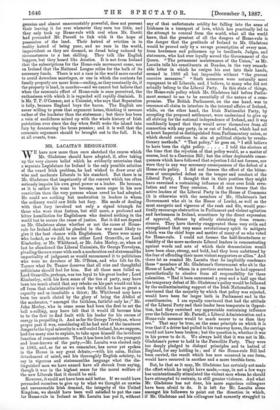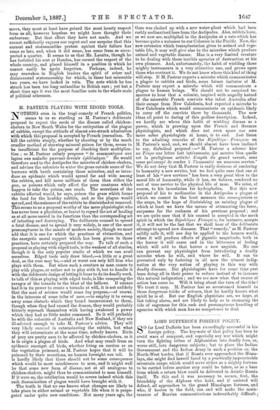MR. LACAITA'S RESIGNATION.
WE have now more than once sketched the course which Me. Gladstone should have adopted, if, after taking up the very sincere belief which he evidently entertains that a separate Legislature for Ireland is the only possible solution of the vexed Irish problem, he had wished to draw over all wise and moderate Liberals to his standard. Bat there is in Mr. Gladstone that impetuosity of the convert which too often seriously impairs his own great, power as a leader. He became, as it is rather his wont to become, more eager in his new conviction than the very persons whose creed he had adopted. He could see nothing but moderation in leaders in whom the ordinary world saw little but fury. His mode of dealing with that fury involved not only a signal triumph for those who were thus furious, but still more, a profound and bitter humiliation for Englishmen who desired nothing in the world but to secure the cause of justice. But it did not depend on Mr. Gladstone alone whether or not the cause of Home- rule for Ireland should be pleaded in the way most likely to give it the best chance with Englishmen. There were many who looked, as we did, to see either Lord Granville, or Lord Kimberley, or Mr. Whitbread, or Mr. John Morley, or, when at last he abandoned the Liberal Unionists, Sir George Trevelyan, pleading the new cause with such a moderation and statesmanlike impartiality of judgment as would recommend it to politicians who were no devotees of Mr. O'Brien, and who felt for Dr. Tanner what Dr. Tanner deserves that all wise and thoughtful politicians should feel for him. But all these men failed us. Lord Granville, perhaps, was too loyal to his great leader ; Lord Kimberley, with his keen sense of the ties of party, may have been too much afraid that any rebuke on his part would cut him off from that administrative work for which he has so great a capacity and so insatiable a thirst; Mr. Whitbread may have been too much elated by the glory of being the Abdiel of the moderates, "amongst the faithless, faithful only he ;" Mr. John Morley, who in some sense had been the first to set the ball a-rolling, may have felt that it would ill become him to be the first to find fault with his leader for his excess of energy in propelling it. And as for Sir George Trevelyan, whose proper part it was, considering all he had said of the imminent danger to the loyal minority in a self-ruled Ireland, he,we suppose, had too many sins to expiate, to take upon himself the invidious function of remonstrance. Thus it has been left to the youngest and least-known of the party,—Mr. Lacaita was elected only in 1885, and, so far as we remember, has never yet spoken in the House in any great debate,—with his calm, Italian detachment of mind, and his thoroughly English sobriety, to say in vigorous and statesmanlike language what the dis- tinguished men we have named have all shrunk from saying, though it was in the highest sense for the moral welfare of the new Liberals that it should be said.
However, it could not have been said better. If we could have persuaded ourselves to give up to what we thought an unwise and unreasonable Irish demand, the integrity of the United Kingdom, we should have been well satisfied to put the case for Home-rule in Ireland as Mr. Lacaita has put it, without any of that unfortunate avidity for falling into the arms of Irishmen in a transport of love, which has practically led to the attempt to conceal from the world, what all the world knew, that the greatest of all the dangers of Home-rule is the danger that the gratitude of Ireland to Mr. Gladstone would be proved only by a savage proscription of every man, from herdsmen and policemen up to landlords, Judges, and statesmen, who had ever loyally served the Government of the Queen. "The permanent maintenance of the Union," as Mr. Lacaita tells his constituents at Dundee, in the very remark. able letter in which he resigns his seat into their hands, seemed in 1886 all but impossible without "the gravest coercive measures." "Such measures were naturally most repugnant to all Liberals, and, I believe, to many who did not actually belong to the Liberal Party. In this state of things, the Home-rule policy which Mr. Gladstone laid before Parlia- ment seemed to me to be essentially of the nature of a com- promise. The British Parliament, on the one hand, was to renounce all claim to interfere in the internal affairs of Ireland, while, on the other hand, the Irish Nationalist Party, by accepting the proposed settlement, were understood to give up all striving for the national independence of Ireland, and it was confidently hoped that they would sever themselves from all connection with any party, in or out of Ireland, which had not at heart Imperial as distinguished from Parliamentary union, or which should continue to aim at political objects by revolu- tionary methods." "That policy," he goes on, "I still believe to have been the right policy I told the electors at the time that the rejection of that policy would, as a matter of course, lead to a Coercion Bill ; but the other deplorable conse- quences which have followed that rejection I did not foresee, nor were they in any way necessary consequences of the defeat of a Home-rule policy. I did not foresee the effect of the bitter- ness of unexpected defeat on the temper and conduct of the Liberal Party. I thought that in their position they might have exercised a restraining influence at once over Irish revo- lution and over Tory coercion. I did not foresee that the active leaders of the Liberal Party in the House of Commons (it is otherwise with the members of Mr. Gladstone's last Government who sit in the House of Lords), as well as the most energetic and vigorous of the rank and file, would prac- tically encourage obstruction in Parliament and violent agitation and lawlessness in Ireland, sometimes by the direct expression of approval, oftener by silently abstaining from remon- strance. They have thereby exaggerated those very evils and strengthened that very same revolutionary spirit to mitigate which was the chief hope and motive of many of us who voted for Home-rule. I could not foresee the half-heartedness or timidity of the more moderate Liberal leaders in remonstrating against words and acts of which their denunciation would have been clear, strong, and bold, had they been unfettered by the fear of offending their more violent supporters or allies." And there let us remind Mr. Lacaita that he implicitly condemns those "members of Mr. Gladstone's Government who sit in the House of Lords," whom in a previous sentence he had appeared parenthetically to absolve from all responsibility for these calamities. "Had it been announced a year and a half ago that the temporary defeat of Mr. Gladstone's policy would be followed by the undiscriminating support of the Irish Nationalists, I am convinced that the majority by which that policy was rejected, would have been far larger both in Parliament and in the constituencies. I am equally convinced that had the attitude of the Liberal Party and their leader been temperate in Opposi- tion, had they exercised any appreciable restraining influence over the followers of Mr. Parnell, a Liberal Administration and a Home-rule measure would be much nearer to us than they are." That may be true, on the same principle on which it is true that if a driver had pulled in his runaway horse, the carriage would not have been broken; but the question is, whether it was in his power to do it. We always held that it was not in Mr. Gladstone's power to hold in the Parnellite Party. They were too deeply pledged to disloyal principles and to hatred of England, for any holding in ; and if the Home-rule Bill had been carried, the result which has now occurred in one form, would have occurred in another and a more terrible form.
But, be that as it may, Mr. Gladstone has certainly not made the effort which he might have made,—nay, in not a few ways has unintentionally stimulated the violent men whom he should have attempted to restrain, to still greater violence. And what Mr. Gladstone has not done, his more sagacious colleagues have been afraid to do. It is left for Mr. Lacaita alone amongst his followers to point out the direction in which, if Mr. Gladstone and his colleagues had earnestly struggled to move, they must at least have gained the most hearty respect from us all, however hopeless we might have thought their endeavour. But that effort they have not made. And we cannot sufficiently express our regret and our surprise that this earnest and statesmanlike protest against their failure has come so late, and, when it did come, has come from so unex- pected a quarter. It seems to us that Mr. Lacaita, though he has forfeited his seat at Dundee, has earned the respect of the whole country, and placed himself in a position in which he cannot easily be again forgotten. Perhaps, indeed, he may reawaken in English leaders the spirit of sober and disinterested statesmanship for which, in these last miserable two years, we have looked in vain. The note which he has struck has been too long unfamiliar to British ears ; yet but a short time ago it was the most familiar note in the whole scale of political utterance.










































 Previous page
Previous page